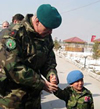Number 33 | January 7, 2008
The following is an excerpted version of an article by Michael Rubin, Resident Scholar at the American Enterprise Institute published on January 4, 2008. The full version of the article can be found at www.aei.org.
Michael Rubin: Turkey’s Terror Problem is Ours
It has been nearly two months since the Kurdistan Workers' Party (PKK) sparked an international crisis with a major attack inside Turkey (…) President Bush promised Prime Minister Recep Tayyip Erdogan that Washington would aid Turkey's fight against terrorism. Heady talk of intelligence sharing and cooperation followed and, indeed, may have been a factor in Turkish air strikes on PKK targets in Iraqi Kurdistan.
Yet at the same time, the Bush administration --more precisely, its increasingly assertive State Department--has embraced an ill-advised diplomatic strategy toward the PKK that will likely backfire on our long-standing NATO ally and could serve to undermine what is left of Bush's global war on terrorism (…)
With one hundred thousand Turkish troops amassed alongside the Iraqi frontier, it is understandable that U.S. diplomats want to avert a military crisis. But rather than take a zero-tolerance policy toward terrorism, the State Department is counseling Turkey to offer political concessions (…) The desired political solution seems to be Iraqi Kurdish action to close down the safe haven on Iraqi soil in exchange for a general amnesty law in Turkey to forgive most PKK members (…) such a deal at this time would be cockeyed. Turkey has a legitimate grievance against both the PKK and Iraqi Kurdish leader Massoud Barzani (…)This need not mean solely a military solution either. Rather, U.S. officials should threaten isolation and a cessation of all financial assistance until Barzani ceases his safe haven (…)
The PKK has its roots in the revolutionary turmoil of the 1970s (…) In August 1984, the PKK launched an insurgency in southeastern Turkey. Like Pol Pot's Khmer Rouge, it targeted the educated and modern. PKK terrorists executed school teachers for being public servants. PKK gangs burned medical clinics and murdered their staff. Health care collapsed. As al Qaeda would do two decades later in Iraq, the PKK destroyed critical infrastructure to drive a wedge between the state and the local population. Before ending in 1997, the PKK campaign claimed thirty thousand lives--the majority ethnic Kurds killed by the PKK itself.
The terror campaign ended not with political concession, but coercion: Turkey threatened to expand its military campaign to Syria, which sheltered the PKK. As the Turkish military mobilized along Syria's frontier, Syrian president Hafez al-Assad blinked and ordered the PKK out. [Abdullah] Ocalan sought Greek protection. Rather than try to negotiate compromise with a terrorist, U.S. forces took a no-nonsense approach. U.S. (and Israeli) intelligence tipped Ankara off to Ocalan's whereabouts. On February 16, 1999, Turkish Special Forces captured the PKK leader outside the Greek Embassy in Nairobi. Today, Ocalan serves his life sentence on the prison island of Imrali, but he controls his organization through trusted lieutenants.
Every time the PKK finds a safe haven, it renews violence. Iran briefly sheltered PKK fighters after their expulsion from Syria. No sooner had the PKK established camps than it restarted its terrorism. Turkey responded by bombing both PKK targets and Iranian Revolutionary Guard Corps posts around the Iranian town of Piranshahr. While Tehran seldom takes diplomatic demarches or deals seriously, faced with a military redline, the ayatollahs, too, backed down. No U.S. official, obviously, counseled that Turkey should compromise.
And yet, in the name of diplomacy, the Bush administration now does. The White House validates Barzani's decision to play the terror card. For the State Department to accept Barzani's excuse--that Kurdish solidarity prohibits a crackdown upon the PKK--is naïve.
Kurdish solidarity is an oxymoron. Throughout the 1990s, Barzani fought the group he now protects. His change of heart came after the Turkish parliament's 2003 decision not to participate in Operation Iraqi Freedom. Overestimating the chill in U.S.-Turkish relations, he took a hard line against Ankara. As Turkey at the time offered amnesty to those rank-and-file PKK members without blood on their hands, Barzani welcomed the PKK leaders he once fought. Turkish authorities say they have photographs of senior PKK commanders receiving medical treatment in Erbil hospitals and meeting with Barzani associates in nearby restaurants. Last spring, Barzani threatened in an Al Arabiya television interview to unleash insurgency inside Turkey (…)
While Kurdish officials tell credulous diplomats that the PKK threat would disappear if only Ankara offered greater concessions, the opposite is true: concessions fuel terror (…) Every country has the right to defend its citizens from terrorism. So long as [Barzani] provides the PKK a safe haven, he is a terror enabler. Forcing Turkey to negotiate with the PKK or its intermediaries would only justify its terrorism (…)

























